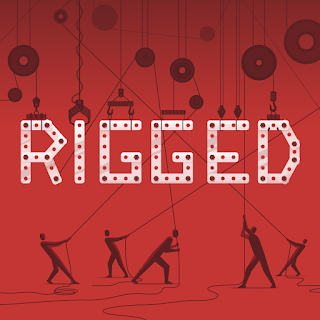At the dawn of the internet, we naively prophesized that people would have access to more information than ever before. What's the capital of Belgium? When did The Beatles break up? Is the tomato a vegetable or a fruit?
Along with "nice to know," "need to know," and "let's set the record straight" types of information, we are today inundated with disinformation about election fraud, magnets and chips in vaccine shots, the sons of dead presidents risen from the dead, a long-dead South American dictator tinkering with voting machines, and quack cures for the pandemic.
Something had to be done about the vortex of disinformation swirling throughout American culture. Fortunately, host of the podcast Drilled and founder of the podcast network Critical Frequency decided to do something.
The new podcast Rigged, exploring the history and functionality of disinformation, just concluded its first season.
The podcast reminds us of past disinformation campaigns, such as tobacco not causing cancer, oil drilling actually being good for the environment, and the denial of science in favor of crackpots, quacks, and con men.
And this week, podcast publication Bello Collective included Rigged on its list of "100 Outstanding Podcasts From 2021." They wrote:
Rigged, "The Birth of SponCon"
Critical Frequency
I first learned that public relations was created as a playbook to sway public opinion around multi-million and billion dollar industries from a past episode of Drilled, the flagship Critical Frequency podcast about climate change. Rigged hones in on just the PR piece of things; in particular, how it shapes disinformation that we know and see all around us. "The Birth of SponCon" fascinated me because sponsored content is the simplest of all the tactics and the easiest to identify, yet it's so pervasive you can forget it's even happening. Open your hearts and minds to this series.
Across six episodes, host Amy Westervelt explores how techniques we see today from science denial to astroturfing have their roots as far back as the early 1900s. This history remains essential to understanding - and combating - the ways disinformation is spread today. (A new study just last week examined about how PR firms help fossil fuel companies improve their image and block climate action using many of these same techniques).
Catch up on the first season of Rigged, available on all podcast platforms, and explore the companion site at http://rigged.media. Here's a breakdown of the first six episodes.
Ep 1: The Classic American Breakfast
The Technique: Fake Experts
The Practitioner: Edward Bernays
Time Period: 1940s
Industry: Food
Apple - Spotify
Ep 2: Ye Olde Crisis Actor Myth
The Technique: Crisis Actors
The Practitioner: Ivy Lee
Time Period: 1914
Industry: Coal
Apple - Spotify
Ep 3: A Tie Is a Win
The Technique: Science denial
The Practitioner: John W. Hill
Time Period: 1950s-1980s
Industry: Tobacco
Apple - Spotify
Ep 4: The Birth of SponCon
The Technique: Sponsored Content
The Practitioner: Herb Schmertz
Time Period: 1960s-1980s
Industry: Oil
Apple - Spotify
Ep 5: Fun with Front Groups
The Technique: Astroturfing
The Practitioner: Daniel Edelman
Time Period: 2000s
Industry: Retail
Apple - Spotify
Ep 6: How a Standard Oil PR Guy Shaped Post-War America
The Technique: Misdirection
The Practitioner: Earl Newsom
Time Period: 1940s
Industry: All of them
Apple - Spotify

Comments
Post a Comment
Thank You for your input and feedback. If you requested a response, we will do so as soon as possible.